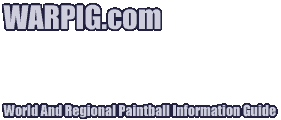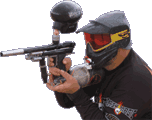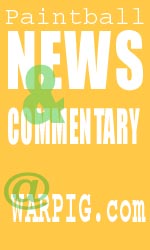  |
|
|
|
|
|
|
  |
|
|
|
|
|
|

What do you think? Add your comments in WARPIG's Forums
|

NXL - Same triggers, new leagues By Bill Mills 9 July, 2004 Since the start of the 2004 season, the National X-Ball League (NXL) has undergone some significant changes. Before the season started, Gameface Paintball changed the entire line-up of its Detroit franchise, replacing Detroit Thunder with Strange which had previously been playing X-Ball at the Division One level. After the Mardi Gras Open, location of the NXL’s first competition of the season, the league added its first expansion team, San Diego Legacy. From the outset, one of the NXL’s rules was that any player on an NXL roster may only play in other leagues as sanctioned by the NXL, or be subject to fines and or disqualification from the league. In both the 2003 and 2004 seasons, the NPPL Super 7 was not on the list of approved leagues. Following the 2004 PSP Orlando Open, the members of Miami Effect formed up under the name Infamous and played Super 7 event in Tampa, where they grabbed the first place trophy, and placed second in Division I X Ball at PSP’s Chicago Open. The Miami franchise, owned by Richmond Italia of Procaps was temporarily empty until it was purchased by Bill Gardner of Smart Parts who then filled it with a new team led by Rowdy MacDonald. In a recent interview with the NPPL staff, Travis Lemanski of Team Infamous said, “I think the group as a whole just wanted the freedom to play paintball wherever they could….it made sense to be a ‘pro’ and play for money and to represent our sponsors in the best way possible. How much can you actually represent your sponsors by only playing 5 events? You owe it to them to be at every major event.” Shortly after the players of Infamous left the league, the NXL changed its rules, at least for the time being, to permit its players to also compete in the Super 7. Schedule conflicts will likely still remain as a barrier keeping the NXL players out of Division One at the PSP tournaments. While NXL players can play out of league, the franchised team names are trademarked, and league restrictions prevent them from being used in unapproved places. Present Internet rumors have claimed that Aftershock will be playing as "Aftershock," and the Oakland Assassins as "Ironmen" at the upcoming NPPL Denver tournament. Chicago Aftershock’s Todd Adamson has reported to WARPIG that he and his teammates are planning to use the name “Shock” in Denver, rather than the NXL franchise name of "Aftershock." In an e-mail interview with WARPIG.com, the NXL Commissioner, Mike Ratko summed up the situation, “Any use of the name outside the NXL(tm) by players is not allowed. This is a pure business requirement dictated by third parties interested in working with the NXL(tm). The names and images of the NXL(tm) are to be protected. The NXL(tm) cannot trademark a city but it can trademark and/or protect the team name (e.g. Strange). Bob Long's Ironmen would not be allowed nor would anything Ironmen. Shock is not Aftershock.” Like all paintball leagues, the NXL changes its rules to keep current with technology, event promoters, and the needs of the teams in the league. A rules change in the NXL is first proposed by the team’s rules committee, and discussed with the team owners. After adjustment it comes up for vote, and is enacted if it is approved by a two thirds majority. While the rule change to allow playing out of league was not agreed upon by every team owner, the vote did reach the needed two thirds majority to pass. One current rule under consideration for change is the restriction to true semi-automatic operation. With the use of microprocessor-based electronics in most modern tournament level paintguns, cheating by increasing the rate of fire past the number of trigger pulls is a serious concern. Software can potentially be set up to not filter out trigger switch noise, or even simply add shots when a player achieves a certain rate of fire, or taps a predetermined sequence on the trigger. While devices like the Super 7’s trigger robot can catch a paintgun that is operating illegally while it is in that illegal mode, they can’t unlock a cheater mode hidden in the software. Since a board with cheater software installed in it looks no different than a board with legal software, even and fair enforcement of true semi-auto operation is a very impractical process, if not impossible under present tournament formats. Presently, different versions of paintgun operation and trigger rules are being considered by the NXL’s rules committee to address this issue. One suggestion on the table is that rate of fire and trigger cycling simply be ignored. If the various boost, turbo, and ramping modes are made legal, they won’t be a concern for enforcement. Rumors have been recently
circulating on Internet message boards claiming that such a rule change
has already been made, but according to Commissioner Ratko, those rumors
are false. Ratko told WARPIG.com, “The NXL(tm) has not changed any
rules regarding markers at this time. We are trying to find a way
to address the cheating issue with
|
| Copyright © 1992-2019
Corinthian Media Services. WARPIG's webmasters can be reached through our feedback form. All articles and images are copyrighted and may not be redistributed without the written permission of their original creators and Corinthian Media Services. The WARPIG paintball page is a collection of information and pointers to sources from around the internet and other locations. As such, Corinthian Media Services makes no claims to the trustworthiness or reliability of said information. The information contained in, and referenced by WARPIG, should not be used as a substitute for safety information from trained professionals in the paintball industry. |